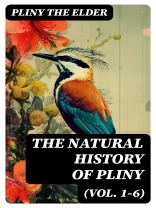In ‘The Natural History of Pliny (Vol. 1-6)’, Pliny the Elder offers an unparalleled compendium that encapsulates the breadth of ancient knowledge and inquiry. Written in the 1st century CE, this monumental work spans various disciplines, including astronomy, geography, botany, and zoology, employing a meticulous yet narrative-driven style that reflects the Roman quest for understanding the natural world. Pliny’s organizational structure of books—ranging from cosmology to the properties of minerals—invites readers into a scholarly discourse, revealing the interconnectedness of nature while simultaneously reflecting the intellectual currents of his time, characterized by a blend of empirical observation and mythological interpretation. Pliny, a Roman author and naturalist, was motivated by a profound curiosity about the world and a desire to preserve knowledge. His experiences as a military commander and a public official allowed him unique insights into the practical applications of natural history, including agriculture and medicine. This background, intertwined with his admiration for earlier scholars like Aristotle and Theophrastus, solidified his commitment to documenting and classifying the natural phenomena around him amidst the turbulent socio-political landscape of the Roman Empire. Pliny’s ‘Natural History’ is not merely an encyclopedia but an invitation to engage with the intricacies of the natural world. Readers of all backgrounds—from scholars to laypersons—will find this work both enlightening and accessible, offering a timeless perspective on humanity’s enduring relationship with nature. It is a crucial text for anyone seeking to understand the foundations of scientific thought and the legacy of classical learning.
लेखक के बारे में
Gaius Plinius Secundus, known to history as Pliny the Elder, was a Roman author, naturalist, and natural philosopher who lived from AD 23/24 to 79. Pliny’s erudition was encyclopedic, and his seminal work, ‘The Natural History of Pliny’, stands as one of the largest single works to have survived from the Roman Empire to the modern day, aiming to document all human knowledge of the natural world. In this multivolume work, running from Volumes 1 to 6, Pliny attempted to cover a vast array of subjects, including geography, anthropology, medicine, and the arts, representing an invaluable resource for scholars of the ancient world. Distinguished by his tireless curiosity, Pliny’s literary style is noted for its exhaustive detail and wide-ranging content, reflecting the author’s ambition to compile a compendium of all known facts about the natural universe (Pliny the Elder, 1855). A contemporary of emperors and a commander in the Roman Empire, Pliny’s life ended with the same dedication to knowledge that marked his career: he died while investigating the eruption of Mount Vesuvius in AD 79, an event that famously destroyed the city of Pompeii. Pliny’s work provides historians and scholars with an extraordinary glimpse into the breadth of intellectual pursuit in the ancient world and continues to be a subject of study and admiration in the field of classical literature.












